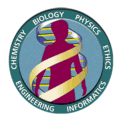|
Basic
Information About
the Project Medicine
& Ethical,
Legal, Education Research
Publications
|
The Human Genome Project (HGP), sponsored in the United States by the Department of Energy and the National Institutes of Health, has created the field of genomics --understanding genetic material on a large scale. The medical industry is building upon the knowledge, resources, and technologies emanating from the HGP to further understanding of genetic contributions to human health. As a result of this expansion of genomics into human health applications, the field of genomic medicine was born. Genetics is playing an increasingly important role in the diagnosis, monitoring, and treatment of diseases. Diagnosing and Predicting Disease and Disease Susceptibility
The ultimate goal is to use this information to develop new ways to treat, cure, or even prevent the thousands of diseases that afflict humankind. But the road from gene identification to effective treatments is long and fraught with challenges. In the meantime, biotechnology companies are racing ahead with commercialization by designing diagnostic tests to detect errant genes in people suspected of having particular diseases or of being at risk for developing them. An increasing number of gene tests are becoming available commercially, although the scientific community continues to debate the best way to deliver them to the public and medical communities that are often unaware of their scientific and social implications. While some of these tests have greatly improved and even saved lives, scientists remain unsure of how to interpret many of them. Also, patients taking the tests face significant risks of jeopardizing their employment or insurance status*. And because genetic information is shared, these risks can extend beyond them to their family members as well. *Passing of the 2008 Genetic Information Nondescrimination Act should protect against such discrimination. May 2008. Disease Intervention The potential for using genes themselves to treat disease--gene therapy--is the most exciting application of DNA science. It has captured the imaginations of the public and the biomedical community for good reason. This rapidly developing field holds great potential for treating or even curing genetic and acquired diseases, using normal genes to replace or supplement a defective gene or to bolster immunity to disease (e.g., by adding a gene that suppresses tumor growth). See an article that speculates about how genetic advances sparked by the Human Genome Project may affect the practice of medicine in the next 20 years. For More, See the Webpages in this Medical Genetics Suite Continuing Medical Education in Genetics
Send the url of this page to a friend |
Last modified: Friday, September 19, 2008
Home * Contacts * Disclaimer
Base URL: www.ornl.gov/hgmis
![]() Site sponsored by the U.S. Department of Energy
Office of Science, Office
of Biological and Environmental Research, Human
Genome Program
Site sponsored by the U.S. Department of Energy
Office of Science, Office
of Biological and Environmental Research, Human
Genome Program

